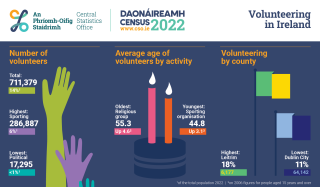Volunteering in Ireland

Results from the 2022 Census show that more than 700,000 people across Ireland volunteered on a regular basis. Of those, 290,000 people (about 6 per cent of the overall population) volunteered with a sporting organisation. Behind sporting organisations, the second most common area where people volunteered was with either a social or charitable organisation or within their community. The CSO Report notes some interesting differences across the country notably that males were most likely to volunteer in a sporting organisation while females were more likely to volunteer in their community, that Leitrim had the highest rate of volunteers at 18 per cent in contrast to Dublin City and South Dublin which had the joint lowest at 11 per cent and volunteering seemed to increase as we age as over one third (38 per cent) of all volunteers was aged between 45 and 64 years of age. Among non-Irish citizens, 11 per cent of males and 12 per cent of females volunteered and over a fifth of citizens of African countries (7,442 people) were involved in at least one voluntary activity.
Supporting the Community & Voluntary Sector
Community and Voluntary organisations have a long history of providing services and infrastructure at local and national level and are engaged in most, if not all, areas of Irish society. They provide huge resources in energy, personnel, finance and commitment that, were it to be sourced on the open market, would come at considerable cost to the State. Over half of all registered charities have between one and 20 volunteers, with three per cent having 250 or more. It is estimated that the value of this volunteering work, using the minimum wage, is €648.8 million per year (this increases to €1.5 billion when using the average income) (Indecon, 2018). It is important to note, however, that this report is based on those charities that are required to register with the Charities Regulator, which accounts for approximately only 300,536 volunteers.
During the recession Government funding for the Community and Voluntary sector reduced dramatically and this has not, as yet, been restored. It is essential that Government appropriately resource this sector into the future and that it remains committed to the principle of providing multi-annual statutory funding. The introduction of the Charities Regulatory Authority, the Governance Code and the Lobbying Register in recent years is intended to foster transparency and improve public trust. However, it is essential that the regulatory requirements are proportional to the size and scope of organisations, and do not create an unmanageable administrative burden which detracts from the core work and deters volunteers from getting involved. In August 2019, the Department of Rural and Community Development published Sustainable, Inclusive and Empowered Communities: A Five-Year Strategy to Support the Community and Voluntary Sector in Ireland 2019-2024. This Strategy sets out the vision for community and voluntary sector development over the next five years. It contains a series of 11 policy objectives across all stakeholders, from Public Participation Networks to civil society organisations to local and national Governments. The Community Services Programme works to tackle disadvantage by providing supports to community-based organisations that enables them to deliver social, economic and environmental services, with a particular focus an areas that, by virtue for geographical isolation or social isolation or have too low a level of demand to satisfy market led providers. The groups in receipt of these services may not otherwise have any access.
Social Justice Ireland recommends that implementation of the five year Strategy be resourced in a way that recognises the important role of the Community and Voluntary Sector, the local role of the PPNs, and the challenges of community development, and seeks to generate real partnerships between communities and agencies.We further urge Government to implement commitments in the National Volunteering Strategy 2021-2025 which has been developed in tandem with both the Community and Voluntary and Social Inclusion Strategies so as to ensure policy coherence across all three.
